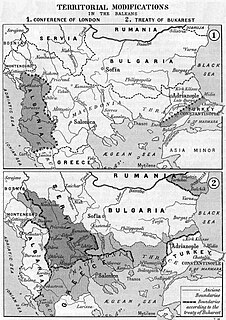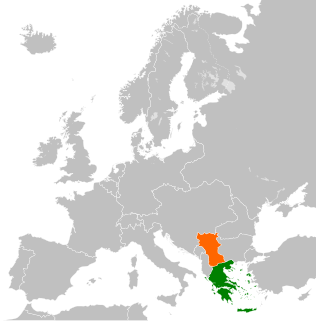 W
WThe Treaty of Bucharest was signed by Serbia and Bulgaria on 3 March [O.S. 19 February] 1886 in Bucharest, marking the end of the Serbo-Bulgarian War. The treaty contained a single article, stating that peace between the two countries was restored. The treaty paved the way for the political imperative whereby only the Bulgarian prince could be a governor of Eastern Rumelia.
 W
WThe Treaty of Bucharest was concluded on 10 August 1913, by the delegates of Bulgaria, Romania, Serbia, Montenegro and Greece. The Treaty was concluded in the aftermath of the Second Balkan War and amended the previous Treaty of London, which ended the First Balkan War. About one month later, the Bulgarians signed a separate border treaty with the Ottomans, who had regained some territory west of the Enos-Midia Line during the second war.
 W
WThe First Geneva Convention for the Amelioration of the Condition of the Wounded in Armies in the Field, held on 22 August 1864, is the first of four treaties of the Geneva Conventions. It defines "the basis on which rest the rules of international law for the protection of the victims of armed conflicts." After the first treaty was adopted in 1864, it was significantly revised and replaced in 1906, 1929, and finally 1949. It is inextricably linked to the International Committee of the Red Cross, which is both the instigator for the inception and enforcer of the articles in these conventions.
 W
WThe Greek–Serbian Alliance of 1913 was signed at Thessaloniki on 1 June 1913, in the aftermath of the First Balkan War, when both countries wanted to preserve their gains in Macedonia from Bulgarian expansionism. The treaty formed the cornerstone of Greek–Serbian relations for a decade, remaining in force through World War I until 1924.
 W
WThe Hague Conventions of 1899 and 1907 are a series of international treaties and declarations negotiated at two international peace conferences at The Hague in the Netherlands. Along with the Geneva Conventions, the Hague Conventions were among the first formal statements of the laws of war and war crimes in the body of secular international law. A third conference was planned for 1914 and later rescheduled for 1915, but it did not take place due to the start of World War I.
 W
WThe Treaty of Serbian–Albanian Alliance, also known as the Treaty of Niš, was a secret treaty signed in Niš between Essad Pasha Toptani and prime minister Nikola Pašić of Kingdom of Serbia on 17 September 1914.
 W
WThe Treaty of London (1913) was signed on 30 May following the London Conference of 1912–1913. It dealt with the territorial adjustments arising out of the conclusion of the First Balkan War. The London Conference had ended on 23 January 1913, when the 1913 Ottoman coup d'état took place and Ottoman Grand Vizier Kâmil Pasha was forced to resign. Coup leader Enver Pasha withdrew the Ottoman Empire from the Conference, and the Treaty of London was signed without the presence of the Ottoman delegation.